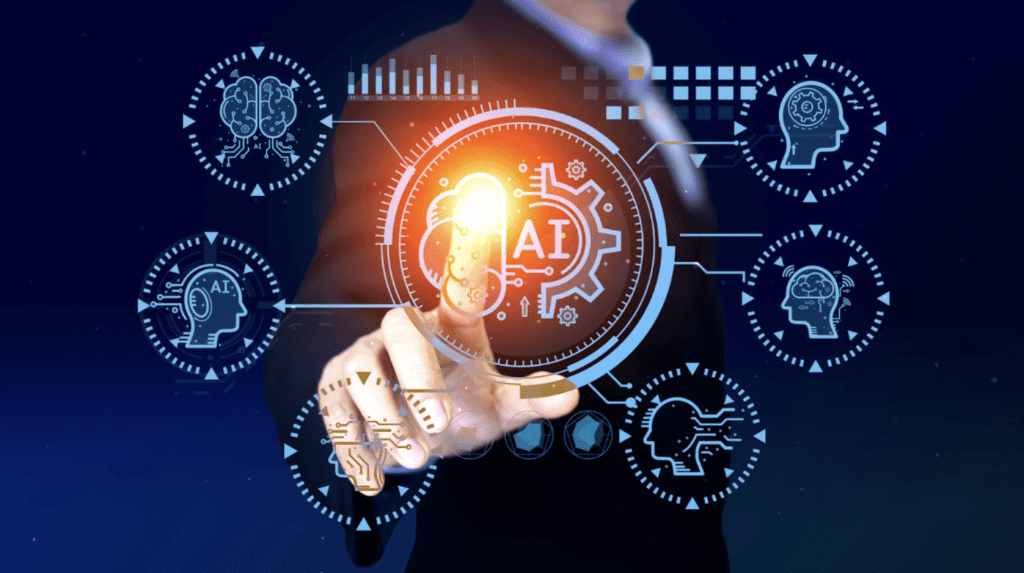Artificial Intelligence is not just a technological tool, but a change in our way of life. Its growing importance and applications promise new possibilities and challenges that we must address. We are on the threshold of a fascinating era where UI is not just a promise, but a reality that will affect our daily lives and the way we perceive technology. What is artificial intelligence and how did it come about?
What is Artificial Intelligence (UI)?
Artificial Intelligence (UI) is a branch of computer science that deals with the development and implementation of systems capable of performing tasks that would require intelligence if performed by a human. Its goal is to create programs and algorithms that can simulate human thinking, learning and decision-making abilities.
Artificial Intelligence is characterized by its ability to adapt and learn from experience, which distinguishes it from traditional programs. These systems can process large amounts of data, identify patterns, make decisions and even communicate in natural human language.
History of artificial intelligence
The journey that led us to Artificial Intelligence (UI) is a fascinating odyssey full of innovation, experimentation and the desire to replicate the human mind. The first signs of artificial intelligence appeared in the 50s, when visionaries in the field of computer science began to dream of creating a machine that would be able to think like a human.
Alan Turing, an icon of theoretical computer science, began this journey in 1950 with the introduction of the Turing Test, which he proposed to measure the intelligence of a machine to behave as if it were a human. These theoretical concepts served as the basis for further steps in the experimental development of artificial intelligence.
Subsequently, in the 60s and 70s, the first experimental projects began to emerge. Terry Winograd introduced the program SHRDLU, which tried to simulate the machine's ability to understand natural language. There were also systems of expert systems that were supposed to imitate human expertise in a specific field.
It was followed by the so-called The “winter era of artificial intelligence” in the 80s and 90s, when funding declined and public interest waned due to a lack of visible achievements.
However, the new millennium brought a twist. Developments in data processing and machine learning algorithms have revived interest in artificial intelligence. Deep learning, which allows neural networks to learn from large amounts of data, has opened up new possibilities. In 2011, the IBM Watson system defeated human opponents in the Jeopardy! game, showing that artificial intelligence can excel at complex tasks.
With the onset of the 21st century, artificial intelligence has become an integral part of our lives - from ChatGPT, virtual assistants to image recognition and recommendations in e-commerce.
Artificial intelligence and its use
Artificial intelligence (UI) offers a wide range of possibilities for use in various industries and areas. Here are some of the main areas where artificial intelligence can make a big difference:
Healthcare:
- Diagnosis and Prediction: Artificial intelligence can analyze medical images and data to quickly and accurately diagnose diseases. In addition, it can predict the development of diseases based on the collected information.
Financial Sector:
- Automated Trading: Artificial intelligence can perform automated trading in financial markets based on analysis of market trends.
- Risk Management: Assists in the identification and management of risks through the analysis of extensive financial data.
E-commerce:
- Personalized Recommendations: Artificial intelligence can analyze customer behavior and provide personalized product or service recommendations.
- Chatbots and Virtual Assistants: Improve customer service through automated interactions and answers to questions.
Production and Logistics:
- Predictive Maintenance: Helps predict machine failures based on monitoring their performance.
- Optimizing Hands Work: Improves the efficiency of production processes and manages logistics.
Education:
- Personalized Lesson Plans: Artificial intelligence can customize lesson plans based on individual student needs.
- Smart Assessment: Helps in assessing and evaluating student performance.
Automobile industry:
- Autonomous Vehicles: Artificial intelligence plays a key role in the development of autonomous vehicles, enabling them to correctly recognize their surroundings and make real-time decisions.
Energy:
- Effective Management of Energy Systems: Artificial intelligence contributes to the optimization of energy production and distribution, thereby reducing costs and increasing efficiency.
Tourism:
- Personalized Itineraries: Artificial intelligence can suggest personalized itineraries based on the user's preferences and history.
- Chatbots for Tourism: They provide information and assistance to tourists through interactive conversations.
Agrarian Sector:
- Precision Farming Practices: Artificial intelligence can assist in precise methods of plowing, irrigation and growing crops to increase yields.
Game Industry:
- Intelligent Virtual Opponents: Artificial intelligence can create dynamic and adaptive virtual opponents in computer games.
Artificial intelligence in the digital world
1. Chatbots and Virtual Assistants:
Interaction on Websites: Modern websites often use chatbots for quick and efficient communication with visitors. Chatbots can answer questions, navigate visitors through pages and provide relevant information. Virtual assistants like ChatGPT are becoming more integrated and able to answer more complex questions with greater accuracy.
2. Personalized Recommendations in E-commerce:
Product Recommendations: When shopping online, artificial intelligence is used to track user preferences and behavior. Based on data analysis, it can then provide us with personalized product recommendations, which greatly improves our customer experience.
3. Natural Language Processing:
Search Engines and News: Search engines such as Google use artificial intelligence to better understand queries and provide more accurate search results. In addition, natural language processing algorithms are also used in news filtering, which influences what is presented to us on the web.
4. Image and Sound Recognition:
Google Photos and Facebook: In the field of image recognition, artificial intelligence enables the categorization and identification of photos. Similar technologies are also used to recognize faces and tag friends on social networks such as Facebook. In addition, in music streaming applications, audio recognition identifies songs and creates personalized playlists.
5. Machine Translation and Language Tools:
Google Translate and Online Dictionaries: Machine translation tools such as Google Translate are increasingly used to translate texts between different languages. Powered by artificial intelligence, these tools improve communication on a global level.
6. Personalized News and Recommendations:
Algorithms on News Portals: News portals use artificial intelligence algorithms to analyze our preferences and reading behavior. The result is personalized news feeds that are tailored to your interests and preferences. Similar algorithms are also used on social media platforms.
7. Automated Email Marketing:
Personalized Emails: In the field of email marketing, artificial intelligence is integrated into processes to create personalized email campaigns. These campaigns are designed based on the analysis of customer behavior and preferences, which increases the effectiveness of reaching customers.
8. Automated Content Evaluation:
Social Network Filters: Social networks use artificial intelligence to automatically rate content and filter out unwanted posts. Algorithms monitor content based on criteria such as safety, authenticity and relevance to protect users from inappropriate content.
Conclusion
With the growth of artificial intelligence comes new challenges. It is important that we as a society learn to understand this technology and use it wisely. Ensuring the ethical use of artificial intelligence, protecting personal data and understanding its limitations are key aspects that will help us live with this technology in harmony.







